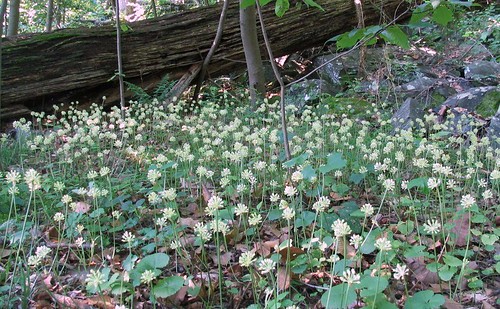 Ramps are well-known in the Appalachians as a sign of spring. When their broad green leaves emerge in April, there are ramp festivals throughout the region, as people cook up the roots and leaves. A member of the genus Allium, ramps are closely related to garlic and onions -- and are often called wild leeks.
Ramps are well-known in the Appalachians as a sign of spring. When their broad green leaves emerge in April, there are ramp festivals throughout the region, as people cook up the roots and leaves. A member of the genus Allium, ramps are closely related to garlic and onions -- and are often called wild leeks.By early June, the leaves have completely disappeared -- they can't photosynthesize much once the trees block their light. But right around now, where the leaves once were, you'll see a single stalk (about 6-8 inches tall) with a pompom of white flowers on top. As they mature, each of the small flower stalks on top will dry and remain in place. In the fall and winter, these dried pompoms stand out even when all other signs of the plant have disappeared -- especially if they still have the shiny black seeds at their tips. (The species name, Allium tricoccum, refers to the three seeds produced by each flower.)
Doug Elliot gives this interesting factoid about ramps in his book Wild Roots
Because of their strong odor, Ramps were called pikwute sikakushia (the skunk) in the language of the midwestern Menomini Indians. Rich woodlands near the southern end of Lake Michigan were said to be a favorite Ramp gathering area, for which reason they called this area shikako, (the skunk place). This is where the fuming, seething, metropolis, now known as Chicago, gets its name.Skunky or no, many wild food enthusiasts say ramps are tastier than any cultivated allium.
In the wild: Ramps are associated with the mountains, but they do grow in the wild along the Potomac -- perhaps the seeds have washed downstream. They grow in profusion at Scott's Run. We also have seen them on an island off the C&O Canal.
In your yard: You'll want a shady spot with rich soil. I'm not aware of nurseries that sell them, but you could try collecting seed in the fall and see if you can get them to come up. They will need to be in the cold outdoors over the winter, just like they would be in the wild. And some may take more than a year before they germinate. But it's worth a try!



